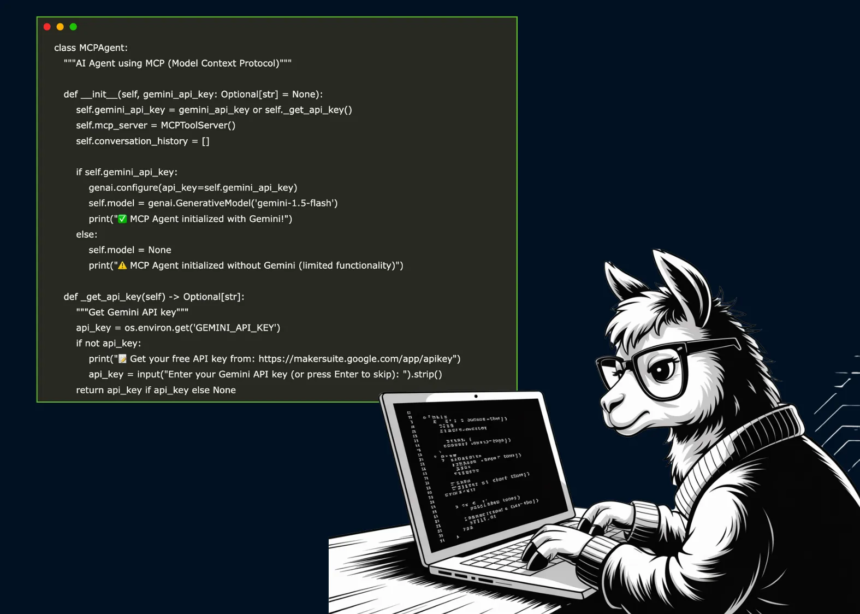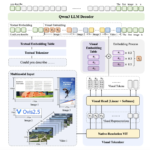In this tutorial, we walk through building an advanced AI agent using the mcp-agent and Gemini. We start by setting up a robust environment with all the necessary dependencies and then implement an MCP tool server that provides structured services such as web search, data analysis, code execution, and weather information. By wiring these tools into an MCP client powered by Gemini, we demonstrate how context-aware reasoning can be combined with external tool execution. Throughout, we emphasize asynchronous design, tool schema definition, and seamless integration between the MCP layer and Gemini’s generative capabilities, ensuring our agent remains modular, extensible, and production-ready. Check out the FULL CODES here.
import subprocess
import sys
import os
from typing import Dict, List, Any, Optional, Union
import json
import asyncio
from datetime import datetime
import logging
def install_packages():
"""Install required packages for the tutorial"""
packages = [
'mcp',
'google-generativeai',
'requests',
'beautifulsoup4',
'matplotlib',
'numpy',
'websockets',
'pydantic'
]
for package in packages:
try:
subprocess.check_call([sys.executable, "-m", "pip", "install", package])
print(f"✅ Successfully installed {package}")
except subprocess.CalledProcessError as e:
print(f"❌ Failed to install {package}: {e}")
install_packages()We begin by defining an install_packages function that specifies all the dependencies required for our tutorial, including mcp-agent, Gemini, and supporting libraries. We then run this function to automatically install each package, ensuring our environment is fully prepared before proceeding further. Check out the FULL CODES here.
import google.generativeai as genai
import requests
from bs4 import BeautifulSoup
import matplotlib.pyplot as plt
import numpy as np
from mcp import ClientSession, StdioServerParameters
from mcp.client.stdio import stdio_client
from mcp.types import TextContent, ImageContent, EmbeddedResource
import mcp.types as types
logging.basicConfig(level=logging.INFO)
logger = logging.getLogger(__name__)We import all the core libraries we need, from Gemini and web scraping utilities to visualization and numerical tools. We also bring in the mcp-agent modules for protocol communication and configure logging so that we can track our agent’s execution flow in real time. Check out the FULL CODES here.
class MCPToolServer:
"""MCP Server that provides tools for the AI agent"""
def __init__(self):
self.tools = {
"web_search": {
"name": "web_search",
"description": "Search the web for information",
"inputSchema": {
"type": "object",
"properties": {
"query": {"type": "string", "description": "Search query"}
},
"required": ["query"]
}
},
"data_analysis": {
"name": "data_analysis",
"description": "Analyze data and create visualizations",
"inputSchema": {
"type": "object",
"properties": {
"data_type": {"type": "string", "description": "Type of analysis"},
"parameters": {"type": "object", "description": "Analysis parameters"}
},
"required": ["data_type"]
}
},
"code_execution": {
"name": "code_execution",
"description": "Execute or generate code",
"inputSchema": {
"type": "object",
"properties": {
"language": {"type": "string", "description": "Programming language"},
"task": {"type": "string", "description": "Code task description"}
},
"required": ["language", "task"]
}
},
"weather_info": {
"name": "weather_info",
"description": "Get weather information",
"inputSchema": {
"type": "object",
"properties": {
"location": {"type": "string", "description": "Location for weather"}
},
"required": ["location"]
}
}
}
async def list_tools(self) -> List[types.Tool]:
"""Return list of available tools"""
return [types.Tool(**tool) for tool in self.tools.values()]
async def call_tool(self, name: str, arguments: Dict[str, Any]) -> List[types.TextContent]:
"""Execute a tool and return results"""
if name == "web_search":
return await self._web_search(arguments.get("query", ""))
elif name == "data_analysis":
return await self._data_analysis(arguments.get("data_type", ""), arguments.get("parameters", {}))
elif name == "code_execution":
return await self._code_execution(arguments.get("language", ""), arguments.get("task", ""))
elif name == "weather_info":
return await self._weather_info(arguments.get("location", ""))
else:
return [types.TextContent(type="text", text=f"Unknown tool: {name}")]
async def _web_search(self, query: str) -> List[types.TextContent]:
"""Perform web search"""
try:
search_url = f"https://www.wikipedia.org/wiki/Special:Search?search={query.replace(' ', '%20')}"
headers = {'User-Agent': 'Mozilla/5.0 (compatible; MCP Agent)'}
response = requests.get(search_url, headers=headers, timeout=10)
if response.status_code == 200:
soup = BeautifulSoup(response.content, 'html.parser')
paragraphs = soup.find_all('p')[:3]
content = "n".join([p.get_text().strip() for p in paragraphs if p.get_text().strip()])
result = f"🔍 Web search results for '{query}':nn{content[:500]}..."
else:
result = f"❌ Web search failed with status: {response.status_code}"
except Exception as e:
result = f"❌ Web search error: {str(e)}"
return [types.TextContent(type="text", text=result)]
async def _data_analysis(self, data_type: str, parameters: Dict) -> List[types.TextContent]:
"""Perform data analysis"""
try:
if "sine" in data_type.lower() or "wave" in data_type.lower():
x = np.linspace(0, 4*np.pi, 100)
y = np.sin(x) + np.random.normal(0, 0.1, 100)
title = "Sine Wave Analysis"
else:
x = np.random.normal(0, 1, 100)
y = np.random.normal(0, 1, 100)
title = "Random Data Analysis"
plt.figure(figsize=(10, 6))
plt.scatter(x, y, alpha=0.6)
plt.title(f"📊 {title}")
plt.xlabel("X Values")
plt.ylabel("Y Values")
plt.grid(True, alpha=0.3)
plt.show()
stats = {
"mean_x": np.mean(x),
"mean_y": np.mean(y),
"std_x": np.std(x),
"std_y": np.std(y),
"correlation": np.corrcoef(x, y)[0,1]
}
result = f"📊 Data Analysis Results:n"
result += f"Dataset: {title}n"
result += f"Sample size: {len(x)}n"
result += f"X - Mean: {stats['mean_x']:.3f}, Std: {stats['std_x']:.3f}n"
result += f"Y - Mean: {stats['mean_y']:.3f}, Std: {stats['std_y']:.3f}n"
result += f"Correlation: {stats['correlation']:.3f}n"
result += f"n📈 Visualization displayed above!"
except Exception as e:
result = f"❌ Data analysis error: {str(e)}"
return [types.TextContent(type="text", text=result)]
async def _code_execution(self, language: str, task: str) -> List[types.TextContent]:
"""Handle code generation/execution"""
try:
if language.lower() == "python":
if "fibonacci" in task.lower():
code=""'def fibonacci(n):
"""Generate fibonacci sequence up to n terms"""
if n <= 0:
return []
elif n == 1:
return [0]
elif n == 2:
return [0, 1]
fib = [0, 1]
for i in range(2, n):
fib.append(fib[i-1] + fib[i-2])
return fib
# Example usage
print("First 10 fibonacci numbers:", fibonacci(10))'''
elif "sort" in task.lower():
code=""'def quicksort(arr):
"""Quick sort implementation"""
def main():
"""Main function for {task}"""
print("Implementing: {task}")
# Add your implementation here
pass
if __name__ == "__main__":
main()'''
result = f"💻 Python Code for '{task}':nn```pythonn{code}n```"
if "fibonacci" in task.lower():
try:
exec(code)
result += "nn✅ Code executed successfully!"
except Exception as exec_error:
result += f"nn⚠️ Execution note: {exec_error}"
else:
result = f"💻 Code template for {language}:nn"
result += f"// {task}n// Language: {language}n// Add your implementation here"
except Exception as e:
result = f"❌ Code generation error: {str(e)}"
return [types.TextContent(type="text", text=result)]
async def _weather_info(self, location: str) -> List[types.TextContent]:
"""Get weather information"""
weather_data = {
"temperature": np.random.randint(15, 30),
"condition": np.random.choice(["Sunny", "Cloudy", "Rainy", "Partly Cloudy"]),
"humidity": np.random.randint(40, 80),
"wind_speed": np.random.randint(5, 25)
}
result = f"🌤️ Weather for {location}:n"
result += f"Temperature: {weather_data['temperature']}°Cn"
result += f"Condition: {weather_data['condition']}n"
result += f"Humidity: {weather_data['humidity']}%n"
result += f"Wind Speed: {weather_data['wind_speed']} km/hn"
result += f"n📝 Note: This is simulated data. For real weather, use a weather API service."
return [types.TextContent(type="text", text=result)]We design the MCPToolServer class that defines and manages all the tools our agent can use, including web search, data analysis, code execution, and weather information. We implement async methods for each tool, enabling the agent to perform the requested operation, such as fetching Wikipedia text, generating visualizations, executing Python snippets, or simulating weather data, and return the results in a structured format. This structure makes our MCP server modular and easily extensible for adding more tools in the future. Check out the FULL CODES here.
class MCPAgent:
"""AI Agent using MCP (Model Context Protocol)"""
def __init__(self, gemini_api_key: Optional[str] = None):
self.gemini_api_key = gemini_api_key or self._get_api_key()
self.mcp_server = MCPToolServer()
self.conversation_history = []
if self.gemini_api_key:
genai.configure(api_key=self.gemini_api_key)
self.model = genai.GenerativeModel('gemini-1.5-flash')
print("✅ MCP Agent initialized with Gemini!")
else:
self.model = None
print("⚠️ MCP Agent initialized without Gemini (limited functionality)")
def _get_api_key(self) -> Optional[str]:
"""Get Gemini API key"""
api_key = os.environ.get('GEMINI_API_KEY')
if not api_key:
print("📝 Get your free API key from: https://makersuite.google.com/app/apikey")
api_key = input("Enter your Gemini API key (or press Enter to skip): ").strip()
return api_key if api_key else None
async def process_request(self, user_input: str) -> str:
"""Process user request using MCP tools and Gemini"""
self.conversation_history.append({"role": "user", "content": user_input})
available_tools = await self.mcp_server.list_tools()
tool_descriptions = "n".join([f"- {tool.name}: {tool.description}" for tool in available_tools])
if self.model:
analysis_prompt = f"""
User request: "{user_input}"
Available MCP tools:
{tool_descriptions}
Should I use a tool for this request? If yes, specify:
1. Tool name (exact match)
2. Arguments as JSON
If no tool needed, respond with "NO_TOOL".
Format: TOOL_NAME|{{"argument": "value"}}
"""
analysis = self.model.generate_content(analysis_prompt).text.strip()
if analysis != "NO_TOOL" and "|" in analysis:
try:
tool_name, args_json = analysis.split("|", 1)
tool_name = tool_name.strip()
arguments = json.loads(args_json)
tool_results = await self.mcp_server.call_tool(tool_name, arguments)
tool_output = "n".join([content.text for content in tool_results])
final_prompt = f"""
User asked: "{user_input}"
I used the {tool_name} tool and got this result:
{tool_output}
Please provide a helpful response that incorporates this information.
"""
response = self.model.generate_content(final_prompt).text
except Exception as e:
response = f"❌ Error using MCP tool: {str(e)}nnLet me help you directly instead.n"
response += self.model.generate_content(user_input).text
else:
response = self.model.generate_content(user_input).text
else:
response = f"🤖 MCP Agent received: {user_input}n"
response += "Available tools: " + ", ".join([tool.name for tool in available_tools])
response += "n💡 Configure Gemini API for full functionality!"
self.conversation_history.append({"role": "assistant", "content": response})
return responseWe define an MCPAgent that wires Gemini to our MCP tool server and maintains conversation history, enabling us to reason, decide on a tool, execute it, and synthesize the result. We fetch the Gemini API key, configure the model, and in process_request, we prompt Gemini to choose a tool (or answer directly), run the selected tool asynchronously, and compose a final response grounded in the tool output. Check out the FULL CODES here.
async def run_mcp_demo():
"""Run comprehensive MCP Agent demo"""
print("🚀 MCP Agent Demo Starting!")
print("=" * 50)
agent = MCPAgent()
demo_queries = [
"Search for information about machine learning",
"Create a data visualization with sine wave analysis",
"What's the weather like in New York?",
"Explain how artificial intelligence works"
]
print("n🧪 Running MCP Tool Demonstrations:")
print("-" * 40)
for i, query in enumerate(demo_queries, 1):
print(f"n📝 Query {i}: {query}")
print("-" * 30)
response = await agent.process_request(query)
print(response)
if i < len(demo_queries):
print("n⏳ Next demo in 3 seconds...")
await asyncio.sleep(3)
print("n✅ MCP Demo completed!")
return agent
async def interactive_mcp_mode(agent: MCPAgent):
"""Interactive mode with MCP agent"""
print("n💬 Interactive MCP Mode!")
print("Type 'quit' to exit, 'tools' to see available MCP tools")
while True:
try:
user_input = input("n🗣️ You: ").strip()
if user_input.lower() == 'quit':
print("👋 Goodbye!")
break
elif user_input.lower() == 'tools':
tools = await agent.mcp_server.list_tools()
print("n🛠️ Available MCP Tools:")
for tool in tools:
print(f" - {tool.name}: {tool.description}")
continue
elif not user_input:
continue
response = await agent.process_request(user_input)
print(f"n🤖 MCP Agent: {response}")
except KeyboardInterrupt:
print("n👋 Goodbye!")
break
except Exception as e:
print(f"❌ Error: {str(e)}")
if __name__ == "__main__":
print("🎯 Advanced AI Agent with MCP (Model Context Protocol)")
print("Built for Google Colab with Gemini API integration")
print("=" * 60)
agent = asyncio.run(run_mcp_demo())
asyncio.run(interactive_mcp_mode(agent))
print("n📚 MCP Tutorial Complete!")
print("n🔍 What you learned:")
print("✅ How to implement MCP (Model Context Protocol) tools")
print("✅ Tool registration and discovery")
print("✅ Structured tool calling with arguments")
print("✅ Integration between MCP tools and Gemini AI")
print("✅ Async tool execution and response handling")We run a scripted demo that initializes MCPAgent, executes a suite of representative queries, and prints Gemini-driven, tool-augmented responses with short pauses between runs. We then drop into an interactive loop where we can list tools, send arbitrary prompts, and observe end-to-end MCP orchestration, before printing a concise recap of the concepts covered.
In conclusion, we now have a comprehensive MCP agent that dynamically decides when to use external tools and how to merge their outputs into meaningful responses. We validate the agent across multiple queries, showcasing its ability to search, analyze, generate, and simulate real-world interactions with Gemini as the reasoning engine. By combining structured MCP protocols with the flexibility of Gemini, we create a template for building powerful AI systems that are both interactive and technically grounded.
Check out the FULL CODES here. Feel free to check out our GitHub Page for Tutorials, Codes and Notebooks. Also, feel free to follow us on Twitter and don’t forget to join our 100k+ ML SubReddit and Subscribe to our Newsletter.
Asif Razzaq is the CEO of Marktechpost Media Inc.. As a visionary entrepreneur and engineer, Asif is committed to harnessing the potential of Artificial Intelligence for social good. His most recent endeavor is the launch of an Artificial Intelligence Media Platform, Marktechpost, which stands out for its in-depth coverage of machine learning and deep learning news that is both technically sound and easily understandable by a wide audience. The platform boasts of over 2 million monthly views, illustrating its popularity among audiences.









